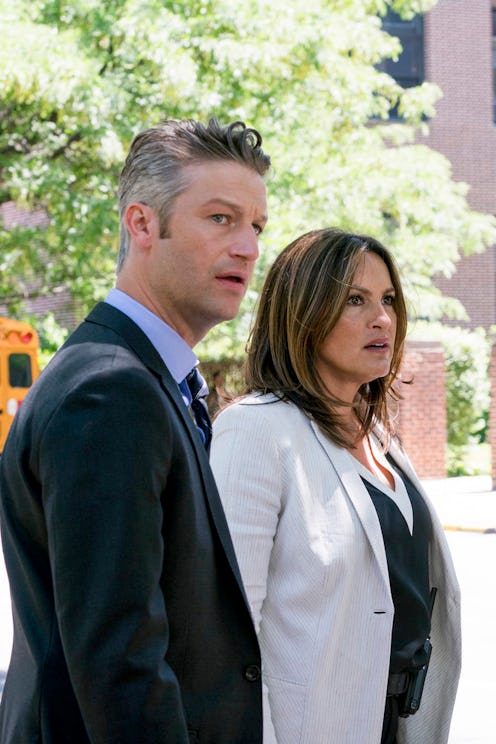Entertainment
What 'SVU' Taught Viewers About Handling Sexual Trauma, According To Mariska Hargitay

Law & Order: Special Victims Unit, which is about to enter its 20th season, has been believing women and fictional survivors of sexual assault since the very beginning — and the real world is still catching up. There's still a long way to go, but the fact that the procedural is rivaling Gunsmoke as the longest-running scripted drama and has never run out of material speaks to its relevance. That was very clear at the 2018 Tribeca TV Festival, where the cast and crew discussed Law & Order SVU's real-world impact, particularly on sexual assault survivors.
"One of the major things I've heard [from viewers] over the 20 years is 'I wish you were the detective on my case,'" Mariska Hargitay said during the Q&A after a screening of the Season 20 premiere. "I think our show in many ways is an ideal unit of how we wish sexual assault and domestic violence was met in the world. Survivors are believed. Period."
Unfortunately, science and law enforcement and our own human understanding of the "neurobiology of trauma," as Hargitay put it, are not on the same page. "One of the issues right now that we're reading about in the press is 'Why didn't she come forward?'" she said. "Any kind of trauma is deeply disorganizing. It scrambles the brain. It fragments memories. These are just facts." SVU gets into those scientific facts and how they affect assault cases, reporting, and consent.
"We've tried to explain things from the survivor's point of view," Hargitay continued. "Which is a voice that traditionally has not been loud enough. A voice that has been deeply, deeply compromised."
At the beginning of the panel, Dick Wolf praised his lead actor and called her the "mother of the #MeToo Movement." While SVU definitely didn't start that movement, the show has helped change our perception of these crimes and bring to light some horrific controversies in the real world.
For example, Hargitay spoke briefly about learning about the backlog of untested rape kits in 2009 and how her activism on that subject (which lead to the Joyful Heart Foundation and the documentary I Am Evidence) started by bringing this issue to the attention of the SVU writer's room, who wrote it into an episode and thus helped educate the public about this problem.
"Cops have told me for years," said Wolf, "the biggest change pre- and post- the show was the percentage of victims who even went to the police, let alone tried to get them to investigate. I think the show's biggest contribution is to tell people it's not your fault." Nodding, Hargitay added "You matter." One day after the panel, survivors shared their stories using the hashtag #WhyIDidntReport in response to the scrutiny of Dr. Christine Blasey Ford, who accused President Trump's nominee to the Supreme Court Brett Kavanaugh of sexual misconduct. This is still a huge issue, though it is heartening to hear that SVU has even made a small impact to that regard.
Law & Order: Special Victims Unit may still be idealistic in many ways, but we're finally catching up thanks to organizations like Joyful Heart and movements like #MeToo. Wolf's next installment in the franchise is Law & Order: Hate Crimes, and there's no way that creative team isn't hoping to make an impact in the world with this new theme, as well. Empathy is everything, and storytelling like this is one of the most effective ways to teach that.